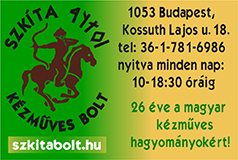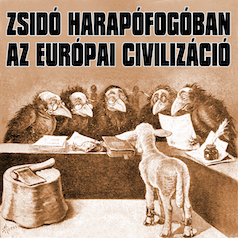A bűnös nép ismét gyilkolt. És ismét szegény, becsületes, keményen dolgozó cigányokat. Nem bir a magyar magával.
English version below
Nem forditanánk le az egész cikket, felesleges. A lényeg, hogy a jól tájékozott bécsi tudósitó szerint Marian Cozma meggyilkolása óta megnövekedett a cigányok ellen elkövetett támadások száma. Pedig, jól tudjuk, azelőtt is napi szinten lőttük, késeltük, erőszakoltuk, fenyegettük mi, magyarok, halomra sötét bőrű barátainkat. Véletlenül sem forditva.
Mi sem bizunk meg száz százalékosan a magyar rendőrségben, de ez esetben talán nem ártott volna tőlük is érdeklődni, és nem csak Paul Lendvai és tsai körében forgolódni.
Boy, 4, murdered in hate war against Hungarian gypsies
Bojan Pancevski, Vienna
SURROUNDED by woodland, the village of Tatarszentgyorgy, near Budapest, is a quiet rural community known for its hunting grounds. But the tranquil retreat was the scene last week of a brutal double murder, stirring fears of a right-wing hate campaign against Hungary’s Roma minority.
Robert Csorba, 27, a farm worker, and his four-year-old son were shot dead as they ran from their home after it had been set on fire. His wife and the couple’s two other young children were seriously injured in the shooting.
Police believe that several attackers plotted the murder, one throwing a firebomb while others opened up with hunting rifles as the family fled.
The Csorba family was described as “decent” and “hard-working” by its neighbours and belonged to the small Roma community living on the edge of the village.
Hungarian politicians have called for an “ethnic peace plan” after the murders, the latest in a string of more than 50 assaults that have claimed the lives of 10 Roma, or gypsies, who are being blamed for a crime wave.
Local police, who initially reported the fire as an accident, now face disciplinary proceedings over claims that they attempted to cover up the case.
“The police were at first unwilling to acknowledge that a murder had taken place,” said Viktoria Mohacsi, a Roma Hungarian member of the European parliament, who visited the scene. “I believe this attack was racially motivated.”
The police, who have established links between at least seven of the attacks, are now offering a £30,000 reward.
Maria Berente, the village’s mayor, said: “There have been tensions between the Roma and the others, but they never got out of hand. The people who did this came from the outside.”
Vladimir Spidla, the European Union’s equality commissioner, said the Roma were being made “scapegoats for wider problems in society”: unemployment is soaring in the countries that are worst affected by the recession. Hungary, once favoured by international investors, narrowly avoided state bankruptcy after the International Monetary Fund joined the EU and the World Bank in a £17.5 billion rescue package. Unemployment is now at 8% and rising fast.
Economic problems have increased the urgency for Hungary to change its treatment of Roma, who are in danger of losing out in the crisis, President Laszlo Solyom said yesterday.
After the latest incident Hungary’s justice minister, Tibor Draskovics, admitted that police had failed to solve cases in which Roma had been murdered. He promised to boost the police presence in rural areas but added that the police could not calm the ethnic tensions in the country.
The only political party that has been rising in the polls is the extreme right Jobbik (the Movement for a Better Hungary), which is accused of being antisemitic and fascist. Its militant wing, the Hungarian Guard, recently banned by a Budapest court, is patrolling Roma-populated areas in black uniforms reminiscent of those worn by wartime fascists.
“The country is paralysed by three types of crime: economic, political and gypsy crime,” said Gabor Vona, 30, its leader.
A growing number of racial attacks on the Roma have been linked to the Hungarian Guard, but party officials reject the claims. Last week they staged a rally against “gypsy crime”.
Up to 7% of the country’s population of 10m is Roma. Attacks on gypsies have become more frequent after the murder of a well-known handball player, Marian Cozma, who was stabbed to death by two Roma drug dealers in a nightclub. At his memorial service last month, protesters chanted: “Death to the gypsies.”
“We have to take decisive action against violence,” Hungary’s prime minister, Ferenc Gyurcsany, wrote in his blog.
Similar tensions are rising in other former eastern bloc countries as the recession deepens. In the Czech Republic, a group close to the far-right Workers’ party called the Protective Corps – including masked thugs armed with fire bombs– clashed with riot police who prevented them from marching on a Roma settlement last November.
The group has published an agenda called The Final Solution to the Gypsy Issue in the Czech Lands, evoking Nazi terminology about the Holocaust.
Az Általatok által elsőként leadott Sunday Times-cikk az állitólagos cigányok elleni támadásokról egy kissé felborzolta az idegeimet, ezért felkerestem az adott oldalt valamiféle hozzászólásra való lehetőség reményében.
Ezt meg is tettem (300 karakterre van lehetőség, igy persze regényt nem lehet irni), megkérdőjelezve a cikkben szereplők 100%-os hitelességét egy Bécsben élő erősen délszláv nevű ember tollából származtatva... Felvetettem, hogy miért harmadik forrásból szerzi be az újság az "információit", ha van ennél megfelelőbb hely is erre (pl. Magyarország).
Semmi egyebet nem irtam, azonban igy is cenzúrázva lettem, azaz hozzászólásom ezek szerint már igy sem volt polkorrekt és NEM KERÜLT BE a hozzászólások közé még fél nap múltán sem. Természetesen a magyarországi állitólagos "súlyos atrocitásokat" elitélő hsz-ek a világ minden tájáról helyet kaphattak...
Úgy látszik, a liberalizmus a maga "szólásszabadságával" mindenhol jelen van, de hogy ennyire, az engem is meglepett. Magyarországon minden különösebb gond nélkül hozzá lehet szólni értelmesen egy-egy cikkhez (persze ha van rá lehetőség), ilyen sztálini cenzúrával még sehol sem találkoztam eddig! Pont a szólásszabadságról, Hyde-parkjáról hires Egyesült Királyságról nem gondoltam, hogy ilyesmi megtörténhet egy ottani oldal kapcsán.
Buga Jakab
Buga Jakab barátomnak és a többi kurucnak!
A Sunday Times Online főszerkeszőjének e-mail cime: online.editor@timesonline.co.uk
Pár ezer levéltől bizton elmegy a kedve!!!
Kiss-Dobos László






